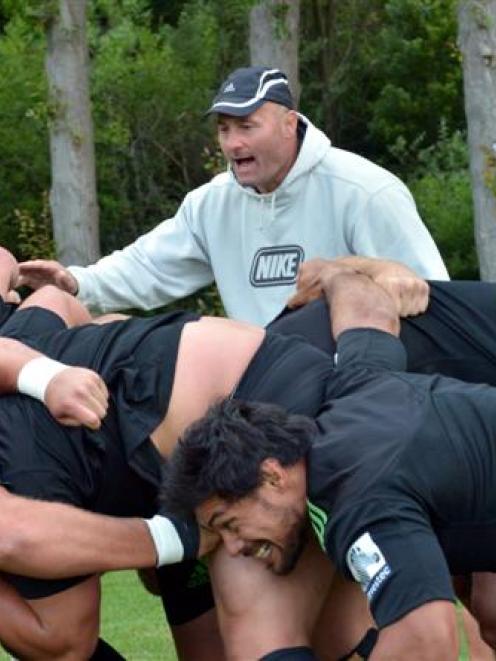ODT Online rugby correspondent Jeff Cheshire ponders the place of the scrum in the modern game.

Yet as time passes, it is a question that seems to have more and more relevance. It has now reached the point where scrums are killing the game and if something is not done quickly, people will begin looking elsewhere for their sporting fix.
In the words of World Rugby (the renamed IRB), "the purpose of a scrum is to restart play quickly, safely and fairly, after a minor infringement or stoppage."
Whether it actually does any of those things is certainly up for debate. We can all agree that most certainly they do not happen quickly, while the number of collapses would suggest that it is not the safest way to restart play either. Indeed, half the time - or perhaps half is being slightly generous - the scrum does not even restart play, as resets, penalties, and free-kicks are fast becoming more plentiful than points in a game.
Add to that the lottery in which these penalties are awarded and it is hard to see in what way, shape or form scrums fulfil their purpose.
The Highlanders 20-17 win over the Chiefs was just the latest in a long line of games in which scrums have been an all too dominant factor.
Upon being reduced to 14-men, the Highlanders scrum struggled for ten minutes against a Chiefs pack that had been no more than even up until that point.
The scrum became an attacking weapon for them. With the ball at the back and able to be used, they elected to keep it in and continue exerting their dominance, forcing the scrum into a mess that led a frustrated referee to award a penalty try. Yet when asked what the penalty try was for, the response was rather vague.
Surely there has to be a clear infringement for a penalty to be awarded? All too often it feels as though it is merely the referee's response after being frustrated by a series of messy scrums. 'What the players are doing is not working, so we will just penalise the team going backwards and move on' seems to the strain of thought. Unfortunately that does not always wash, particularly when you are awarding penalty tries with the explanation that it was a "whole scrum thing".
Sure, often the penalties awarded are justified in that the infringement did occur. But it is seldom the only infringement at the scrum. So how exactly does the referee choose which one to penalise?
Often it feels as though they are simply looking for something. Perhaps they feel that will get the game moving, but it is frustrating and is becoming more and more like a lottery.
The yellow cards are even harder to fathom. Often they come simply from a player, or a whole pack, simply being dominated. In general play a yellow card is given to deter an action. Yet if the player or team is that weak in the scrum, the yellow card is not going to make a difference. The scrum is still going to go backwards, they are still going to infringe eventually if they are that much weaker than the opposition.
We do not yellow card players for being poor tacklers, passers, kickers or runners. So why card them for being out of their depth in the scrum?
It is becoming harder and harder to see a fix. An obvious one would be to implement a "use it" call. By doing this, the team that wins the ball would have to use it as soon as it becomes available at the back of the scrum. This would prevent the penalties that arise from a dominant scrum holding the ball in, knowing that eventually the referee will find something to ping the opposition for. It would stop the scrum being used as an attacking weapon and would force teams to score tries through general play.
The same school of thought was introduced in rucks after the last World Cup and it has sped the game up, while we have had a "use it" call in mauls for years, so why not in the scrums?
This should speed up scrums, decrease collapses due to dominance, reduce the mess and therefore the penalties and ultimately see the game restart more often from the scrum itself. Is that not exactly what World Rugby states the purpose of scrums to be? Teams would be encouraged to get the ball in and out as fast as possible and more rugby could be played.
Of course, this would take the push-over out of the game and would leave those who have dominant scrums feeling hard done by. But it has reached the point where we must decide whether we want to promote scrums or free-flowing rugby.
The players and teams inevitably do not help. They have so much time to practice and analyse that scrumming has become too much of science.
Everything is done to dominate at scrum time and often that means the defensive team trying to disrupt the attacking team's scrum, rather than simply pushing over the ball. This comes from the tight head prop trying to get underneath the opposition hooker and loose head prop, forcing them upwards and preventing them from getting weight behind them.
In theory, scrum penalties should eliminate this from the game. But they do not. In a situation such as this it would not be uncommon for the hooker to be penalised for standing up, or the loosehead prop to be penalised for not pushing straight after being pushed backwards.
It really is a negative tactic, but it is one that is dogging the game. A "use it" call would limit the effectiveness these tactics would have, but it could not eradicate them.
While the referees and administrators can do everything to help fix scrums, the players and coaches still hold responsibility in doing their bit.
Scrumming has become a game within a game and it is turning people off. The players may claim that they must win and will continue to do whatever that takes. Maybe they have a point.
But as more and more people start looking at other options for their sporting fix, rugby will become a far less valuable commodity to advertisers and consequently outlets such as Sky Sport. Without the lucrative television deals that pay much of the players' contracts, professional rugby will take a hit - and it is only at the professional level where scrums are a problem.
So let's see how that one goes for them. Clearly it is in everyone's best interests to get this scrum mess sorted out before it becomes too late.
And if it comes to it, perhaps they should just be done away with. Really, does anyone actually enjoy watching scrums anymore?












